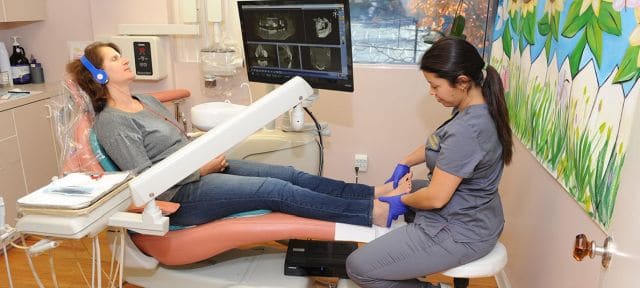Dr. Golden is a graduate of the New York University Dental School, and possesses a solid background in general, cosmetic, and holistic dentistry. She has been trained by the top cosmetic dentists in the country, including top New York City dentists Dr. Marc Lowenberg and Dr. Gregg Lituchy. Her training also included working closely with alternative and biological dentist Dr. Reid Winick.
Dr. Golden completed a two-year internship with Dr. Rau at Switzerland’s Paracelsus Institute, in an effort to further solidify her holistic approach to dental therapies.
She always strives to keep her skills on the cutting edge of technology. She and her team have spent countless hours gaining education in the newest technologies, including laser therapies, 3D digital radiography, ozone therapy, use of zirconia, and much more.
Professional Memberships
- Mercury-Free Dentistry
- International Academy of Biological Dentistry and Medicine
- Dental Amalgam Mercury Solutions
- Holistic Dental Association
- International Academy of Oral Medicine and Toxicology
- American Dental Association
Dental Implants :
People are living longer than ever, and while regular brushing, flossing, and checkups allow many of us to maintain our natural smiles for a lifetime, sometimes our teeth just can’t keep up. If you’ve lost a tooth (or a few teeth) due to injury or disease, dental implants can rejuvenate both your smile and your oral health.
An implant is a synthetic tooth root in the shape of a post that is surgically placed into the jawbone. The “root” is usually made of titanium: the same material used in many replacement hips and knees, and a metal that is well-suited to pairing with human bone. A replacement tooth is then fixed to the post. The tooth can be either permanently attached or removable. Permanent teeth are more stable and feel more like natural teeth.
At Golden Dental, an alternative material is also used called Zirconia. The improvements in new, ceramic materials have made it possible to have the root portion of the implant to be made of a zirconia material. This material is known to be known to be more issue friendly then titanium. It is now FDA approved to be used in the United States.
The ideal candidate for implants is a non-smoker who has good oral health, including a sufficient amount of bone in the jaw, and healthy gums with no sign of gum disease.
Single or Multiple Implants
Implants are versatile. If you are only missing one tooth, one implant plus one replacement tooth will do the trick. If you are missing several teeth in a row, a few strategically placed implants can support a permanent bridge (a set of replacement teeth). Similarly, if you have lost all of your teeth, a full bridge or full denture can be permanently fixed in your mouth with a strategic number of implants.
Advantages Over Dentures or Bridges
Conventional bridges and dentures are not fixed to the bone, and can therefore be unstable. This can make it difficult to eat or smile with confidence. Implants not only look more natural, but feel and act more like normal teeth, with a stronger biting force. And because they don’t directly rely on neighboring teeth for support, implants don’t compromise the health of your natural teeth. In fact, bridges are only expected to last seven to ten years, even less with root canals, whereas implants will typically last a lifetime.
Post-Treatment Care
Consider your replacement teeth to be the same as natural teeth. They require the same daily brushing and flossing, and the same amount of regular checkups. Just like your natural teeth, the better you take care of your replacements, the longer they will last.
Implant Services
Our implant services include:
- Sinus Lift Augmentation:Often the sinuses will enlarge following loss of the upper back teeth. This can preclude placement of dental implants in the upper back areas of the mouth, since the sinus is an air-filled space and dental implants need to be surrounded by solid bone. A sinus lift augmentation/graft is a surgical procedure that restores the sinus cavity to its original size, and replaces the bone that has been lost as a result of the enlarged sinus. This new bone graft typically takes nine to 12 months to heal before the dental implants can be placed into the grafted bone.
- Autogenous Bone Grafting:Occasionally, the ideal areas for dental implants do not have sufficient bone quantity to support the implants. In these cases, it is often necessary to “borrow” bone from another area of your mouth, or to use PRF to graft in the deficient area. Often, the area of choice is from the chin or in the back of the jaw where your wisdom teeth used to be.
- Implant Site Development:When a tooth needs to be removed due to infection, it is not uncommon to have lost bone around the infected tooth. In these cases, various types of bone grafting can be done at the same time the tooth is removed to facilitate the placement of a dental implant at a later date.
- Computer-Enhanced Treatment Planning:We have special software on our computer that allows us to evaluate your dental CT scan in three dimensions for bone quality, bone quantity, and bone location, enabling the best possible placement of your dental implants. This also allows us to work closely and smoothly with your restorative dentist to ensure an ideal result where your dental implants are concerned.
- Implant Maintenance:Once your dental implant restoration is completed, it is important to keep the area clean and infection-free. Dental implants can accumulate plaque and tartar just as teeth can. Whether you have just one tooth replaced by an implant or several, a professional cleaning schedule will be necessary to keep your implants healthy. The time interval for these professional cleanings will be determined by your individual needs.
What is dentistry?
Dentistry is the diagnosis, treatment, and prevention of conditions, disorders, and diseases of the teeth, gums, mouth, and jaw. Often considered necessary for complete oral health, dentistry can have an impact on the health of your entire body.
What is a dentist?
A dentist is a specialist who works to diagnose, treat, and prevent oral health problems. Your dentist has completed at least eight years of schooling, and received either a DDS (Doctor of Dental Surgery) degree, or a DMD (Doctor of Dental Medicine) degree. If your doctor is a pediatric dentist, this means that he or she specializes in caring for children from infancy through their teen years. A pediatric dentist has received the proper education and training needed to work with young kids. Other specializations include:
Endodontics (root canals)
Oral and maxillofacial (including pathology, radiology, and surgery)
Orthodontics and dentofacial orthopedics
Periodontics (gum disease)
Prosthodontics (implants)
Why is visiting the dentist so important?
Visiting the dentist regularly will not only help keep your teeth and mouth healthy, but will also help keep the rest of your body healthy. Dental care is important because it:
Helps prevent tooth decay
Protects against periodontal (gum) disease, which can lead to tooth and bone loss
Prevents bad breath – brushing, flossing, and seeing the dentist regularly will help reduce the amount of bacteria in your mouth that causes bad breath
Gives you a more attractive smile and increases your self-confidence
Helps keep teeth looking bright by preventing them from becoming stained by food, drinks, and tobacco
Strengthens your teeth so that you can enjoy healthy, beautiful smiles for the rest of your life!
My teeth feel fine. Do I still need to see a dentist?
Your teeth may feel fine, but it's still important to see the dentist regularly because problems can exist without you knowing. Your smile's appearance is important, and your dentist can help keep your smile healthy and looking beautiful. With so many advances in dentistry, you no longer have to settle for stained, chipped, missing, or misshapen teeth. Today's dentists offer many treatment choices that can help you smile with confidence, including:
Professional teeth whitening
Fillings that mimic the appearance of natural teeth
Tooth replacement and full smile makeovers
What should I look for when choosing the right dentist for me?
Choosing a dentist who “clicks” with you and your family is important, and you may wish to consider several dentists before making your final decision. During your first visit, you should be able to determine whether the dentist is right for you. During your appointment, consider the following:
Is the appointment schedule convenient?
Is the office easy to get to and close by?
Does the office appear to be clean and orderly?
Was your medical and dental history recorded and placed in a permanent file?
Does the dentist explain techniques for good oral health?
Is information about cost presented to you before treatment is scheduled?
Is your dentist a member of the ADA (American Dental Association)?
How can I take care of my teeth between dental checkups?
ALWAYS remember to brush your teeth at least two times a day, and floss at least once!
Make sure to use toothpaste that contains Xylitol
Avoid foods with a lot of sugar (sugar increases the amount of bacteria that grows in your mouth causing more plaque and possibly cavities) and avoid tobacco (this can stain your teeth, cause gum disease, and eventually lead to oral cancer).
Don't be afraid to brush your tongue! By brushing your tongue, you will remove food particles and reduce the amount of plaque-causing bacteria. Tongue brushing also helps keep your breath fresh.
Be sure to schedule your routine checkup. It is recommended that you visit the dentist every six months.
At what age should I start taking my child to see the dentist?
The American Academy of Pediatric Dentistry (AAPD) recommends that children first see a dentist as early as six months of age and no later than one year of age. During this time, your child's baby teeth will be coming in and your dentist can examine the health of your child's first few teeth. After the first visit, be sure to schedule regular checkups every six months.
How often should I see the dentist?
Children, teens, and adults should all see the dentist for a regular checkup at least once every six months. Patients who are at a greater risk for oral cancer or gum disease may be required to see the dentist more than just twice a year. Your doctor will help determine how often you should visit the dentist for regular checkups.
What is a cavity?
A cavity is a small hole that forms inside the tooth because of tooth decay. Cavities are formed when plaque buildup on the outside of the tooth combines with sugars and starches in the food you eat. This produces an acid that can eat away the enamel on your tooth. If a cavity is left untreated, it can lead to more serious oral health problems. Cavities can be prevented by remembering to brush your teeth at least two times a day and floss between teeth at least once.
What is a filling?
A filling is a synthetic material that your dentist uses to fill a cavity after all of the tooth decay has been removed. Fillings do not generally hurt because your dentist will numb your mouth with an anesthetic. Fillings are made from a variety of different materials, including composites, gold, or ceramic. If you need a filling, be sure to talk to your doctor about what type is best for you and your teeth.
How often should I brush my teeth?
According to your dentist and the American Dental Association, you should brush your teeth at least two times a day. Brushing keeps your teeth, gums, and mouth clean and healthy by removing bacteria-causing plaque. It is also recommended that you use a soft-bristled toothbrush when you brush your teeth. You should spend at least a minute on the top teeth and a minute on the bottom teeth, and remember to brush your tongue; it will help keep your breath smelling fresh!
When should I change my toothbrush?
Your toothbrush will eventually wear out, especially if you are brushing your teeth twice a day for two to three minutes each time. Your dentist recommends that adults and children change their toothbrush every three months. If you are using an electric toothbrush, be sure to read the directions because you may not need to change toothbrush heads as frequently. Patients with gum disease are encouraged to change their toothbrush every four to six weeks to keep any bacteria from spreading. After brushing, rinse your toothbrush with hot water to kill germs and keep the bristles clean. If you've been sick, be sure to change your toothbrush as soon as possible.
What is gum disease?
Also known as periodontal disease, gum disease is mostly caused by plaque and bacteria buildup that is not treated in its early stage. Other causes of periodontal disease include tobacco use, teeth grinding, some medications, and genetics. Gingivitis is the beginning stage of gum disease, and, if detected, is treatable. Gingivitis left untreated may turn into gum disease. Advanced gum disease will lead to tooth and bone loss, and is a permanent condition. Brushing your teeth regularly and visiting the dentist every six months will help prevent gingivitis and more severe cases of periodontal disease. Common signs of gum disease:
Red, irritated, bleeding, or swollen gums
Chronic bad breath
Loose teeth, or loss of teeth
Extreme tooth sensitivity
Receding gum line
Abscessed teeth
If I have braces, do I still need dental checkups every six months?
Yes! In fact, it's even more important that patients receiving orthodontic treatment visit their dentist regularly. With braces, food may be caught in places that your toothbrush can't reach. This causes bacteria to build up and can lead to cavities, gingivitis, and gum disease. Your dentist will work closely with your orthodontist to make sure that your teeth stay clean and healthy while wearing braces.
How do I schedule my next checkup?
Simply call our practice! Our front desk staff will be happy to help schedule your next dental checkup at your convenience. If you are a new patient, please let us know and we will provide you with all the information you need for your first dental visit.







